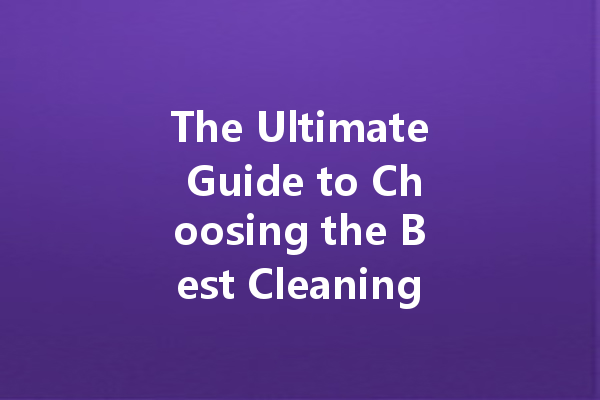Cleaning is an essential part of maintaining a healthy and pleasant living environment. With so many cleaning agents available, it can be challenging to know which one to choose for different tasks. In this guide, we’ll explore various types of cleaning agents, their uses, and tips for selecting the best products for your needs.
Understanding Cleaning Agents
Cleaning agents are substances designed to remove dirt, stains, and germs from various surfaces. They come in different forms, including liquids, powders, foams, and sprays. Each type of cleaning agent has specific ingredients and properties that make it suitable for certain tasks. Understanding these can help you make informed decisions about which cleaning agents to use.
Types of Cleaning Agents
All-purpose cleaners are versatile agents that can be used on multiple surfaces, including countertops, floors, and appliances. They are excellent for everyday cleaning and typically contain a combination of surfactants, solvents, and other cleaning agents. When selecting an all-purpose cleaner, look for one that is environmentally friendly and free from harsh chemicals.
For greasy messes, such as those found in kitchens, heavy-duty degreasers are your best friend. These cleaning agents are formulated to break down oils and grease effectively. They are excellent for cleaning kitchen hoods, stovetops, and appliances. When using degreasers, ensure proper ventilation and follow safety precautions to avoid skin and respiratory irritation.
While cleaning removes dirt and grime, disinfectants kill germs and bacteria. This is especially important in areas prone to infections, like kitchens and bathrooms. Look for products that are labeled as EPA-approved disinfectants to ensure they meet safety standards and are effective for sanitizing surfaces.
Certain cleaning tasks require specialized products. For example, window cleaners are designed to leave glass streak-free, while fabric cleaners maintain the integrity of textiles. Specialty cleaners include those formulated for specific materials such as leather, carpets, and upholstery. Always check the product label for the recommended surfaces to avoid damage.
Choosing the Right Cleaning Agent
Consider the Surface
When choosing a cleaning agent, consider the surface you need to clean. Some cleaners are too harsh for delicate materials. For instance, acidic cleaners can damage natural stones, while harsh solvents may harm wood finishes. Always refer to the manufacturer’s guidelines for the specific surface to ensure compatibility.

Evaluate Efficacy and Safety
Safety should always be a priority when selecting cleaning agents. Check for labels that indicate the product is non-toxic, biodegradable, or environmentally friendly. Reading customer reviews can also provide insight into a product’s effectiveness and safety.
Determine the Cleaning Task
Different cleaning tasks may require specific products. For example, if you need to tackle tough stains, a stain remover may be necessary instead of a general cleaner. For regular cleaning, an all-purpose cleaner is often suitable, but for areas with high contamination risk, such as kitchens and bathrooms, a disinfectant is recommended.
DIY Cleaning Agents
If you prefer natural cleaning solutions, consider making your own cleaning agents at home. Many household ingredients like vinegar, baking soda, and essential oils can create effective cleaning solutions. For example, mixing equal parts of vinegar and water creates a natural all-purpose cleaner, while baking soda acts as a mild abrasive for scrubbing surfaces.
Tips for Effective Use
Read the Instructions
Always read the product instructions before use. Different cleaning agents require different application methods, dwell times, and rinsing processes. Following the instructions ensures optimal results and minimizes the risk of damage.
Test in a Small Area
Before using a new cleaning agent on a large area, it’s wise to test it in an inconspicuous spot. This is especially important for specialty cleaners, as surfaces may react unpredictably.
Maintain a Regular Cleaning Schedule
Consistency is key to cleanliness. Establishing a regular cleaning schedule can help maintain a hygienic environment and reduce the effort needed for deep cleaning. Use appropriate cleaning agents based on the cleaning frequency and types of messes.
Conclusion
Choosing the right cleaning agent means understanding the specific needs of your cleaning tasks. From all-purpose cleaners to specialty agents, there are options for every type of mess. With the right knowledge and products, you can ensure your home remains clean, safe, and welcoming. Take the time to explore the various options available and don’t hesitate to try DIY solutions for a more natural approach!
